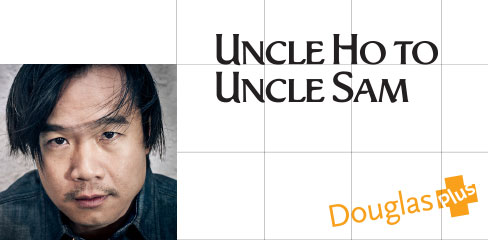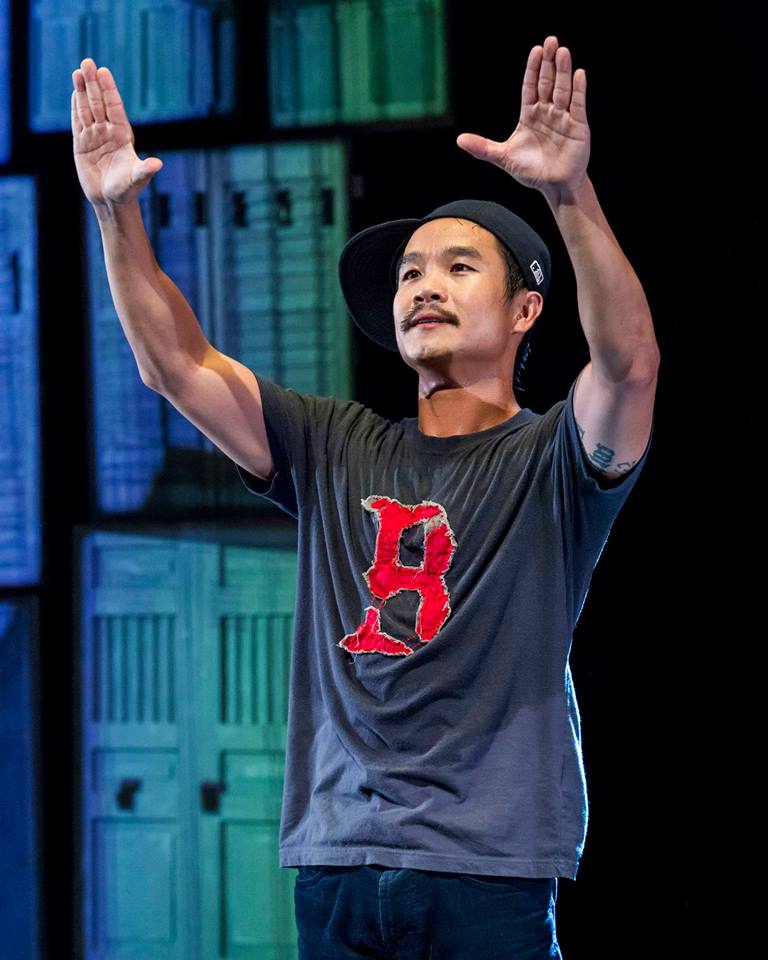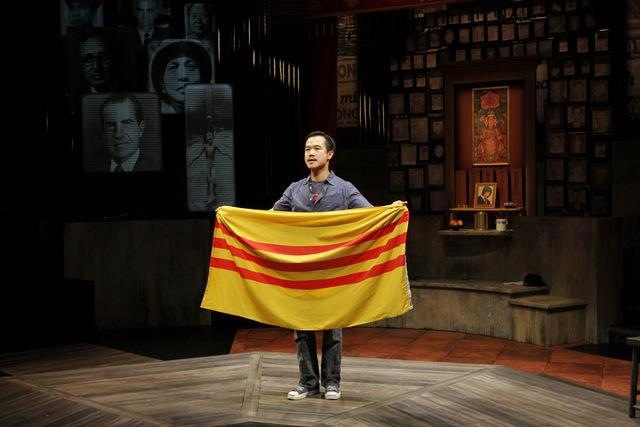You’ve heard the critics rave about it and you’ve read diaCRITICS’ positive review. Now, diaCRITIC Genevieve Erin O’ Brien presents an exclusive interview with Trieu Tran, the the co-author and the star of the one-man show, Uncle Ho to Uncle Sam. Get to know Trieu Tran, his personal journey, his writing process, and his inspirations, and through the man himself.
Have you subscribed to diaCRITICS yet? Subscribe and win prizes! Read more details.
Genevieve Erin O’Brien: First of all congratulations on your one-person show “From Uncle Ho to Uncle Sam,” such an important story to be told. When I was undergraduate, I took a course about “The Vietnam Experience,” taught by the esteemed, now deceased, Walter Capps at UC Santa Barbara. This popular class focused on the Vietnam War and yet failed to include any voices of Vietnamese Americans, who were undoubtedly impacted by the “Vietnam War/American War”. I complained about what I saw as a severely myopic academic presentation of the impact of US involvement in Vietnam. In response, for the last lecture of the quarter, the professor managed to track down a local Vietnamese woman who shared her experiences as a refugee. For other Vietnamese Americans like me, it is so rare that we see and hear our stories reflected, and furthermore, we face increased challenges when we tell our stories and speak our truths. I’d like to ask, are the stories you share in your one-person show all true, and secondly what compelled you to share your story?
Trieu Tran: The play is autobiographical. It is all authentic blood and sweat out there on the stage. Though I use my own personal life, it’s a story about immigrants, refugees and of all displaced people looking to belong. My director and co-writer Robert Egan and I were working on a play in NYC a couple years ago. We would share cigarettes during rehearsal breaks. We got to know one another and Bob became fascinated with my story and felt I had stories that needed to be told. We worked on it together, it was developed at the Ojai Playwrights Conference which Bob runs. It caught the attention of Kurt Beattie who is the Artistic Director of Seattle ACT, who gave us our world premiere there last year. I feel blessed to be able to tell our story. Put faces and names to the other side of the Vietnam Wall Memorial.
Your performance is relentless, one story after another, 90 minutes of increasingly dramatic vignettes comprise the heart of your one-person show. What stories got left on the “cutting room floor” so to speak? What story do you wish you could have included in the show, but for whatever reason were unable to make room for?
TT: 90 minutes is relentless! I’m not as young and energetic as I’d still hope to be. Any more than 90 minutes would require oxygen and paramedics on standby. Omitting aspects of my life was the more difficult thing to do. Example: I actually went to 5 different high schools, not 3. And we were attacked 3 times [by pirates] not one. It would be a 3-hour play not 90 minutes. Names have been changed.
In your show you tell some harrowing tales of your boat escape as a refugee, enduring multiple attacks by pirates, and also of the violence perpetrated by your own abusive father. You even quote the words an old white-haired woman who shared the boat journey with you “Life is never fair, there will always be blood.” I know my own extended family speaks very little of the refugee camps and their experiences as boat people. In the face of speaking the truth about such violence, how has your family responded? What has been the response of the Vietnamese American Community?
TT: I have been embraced by all communities. All demographics have related to the universal themes. Older Vietnamese generation I believe wants to forget. Maybe survival guilt? The current, younger generation are so removed from the war. I am in that middle generation that lived through it, and grew up asking those questions. Our stories, our people are more than what Hollywood depicts. We are a resilient culture and people who have endure for over 4,000 years. Our struggles, I hope my play conveys with dignity.
I loved hearing about Michael Jackson, Bad Boy Blue, Modern Talking, hip hop and other musical and cultural influences as you were growing up. For me as a mixed-race Vietnamese/Irish American I always felt simultaneously on the inside and outside of both American and Vietnamese cultures. Tell me more about your struggles coming to Saskatoon, Saskatchewan, Canada and later emigrating to the Boston, MA in the US? What tactics did you embrace to fit in, adapt or to stand out as you were growing up?
TT: That is all in the play. Come see the show!
“I wanna be a part of this new world… I wanna belong to this America,” you exclaim in your performance, referring to the variety of communities of color and the American melting pot that you so rightly remind us that “has yet to melt.” How did you feel being embraced and rejected by other communities of color – African American, Italian American, Puerto Rican, etc… What about your experiences within the Vietnamese American community or other Asian American communities, like the Khmer Reds gang you refer to in your story?
TT: That is also in the play. Again, come see the show!
You refer to both Richard III and Tupac as major influences in your life, can you share more about how Shakespeare and Tupac gained a place on your cultural and intellectual altar?
TT: I love Shakespeare. His stories like our stories may seem larger than life, maybe too big for the theatre. But it is life, it does resonate and that is what makes theatre compelling. I’ve always been really, really fascinated with the character of Richard III. I felt like it’s kind of similar to my life, or the life of anybody searching for identity. I remember the first time I saw it and I read it, I was surprised to find I related to Richard. Here’s a guy who was born deformed, but he’s on the battlefield. He’s fighting and killing everyone with his brothers, and then the war ends and his sickly brother becomes king. Nobody thanks him. Nobody says anything, they just push him aside like he’s nothing. He’s a nobody just because of the way he looks or the preconceived notions that people have of him. I feel like all Richard wanted was to be loved. He just wanted respect. I feel like that parallels a lot of immigrants or displaced people without a country or without a culture. For me, personally, growing up in America, it doesn’t matter how much I achieve or how much notoriety I attain; a lot of people will always look at me as not American or as a nobody. Or as an Asian, or a chink, or a gook.
Hip-hop itself gives us a voice. Nobody sounded like Tupac prior to him and after him. I was living in the city; before Pac, gansta rap came out and it was like, “Yeah, this is kinda about us.” Tupac came on there and he brought poetry with it. He kind of brought that intellect. He really talked about life in the city: the violence, the hardships, racism, social problems, all the injustices, and themes of pain and aggression. There was an art form to it and a positive message to it. Pac lived it. That’s why I wanted to put hip-hop in the show; I wanted to show audiences that hip-hop is not all bad men. It’s not just I’m in the hot tub drinking and smoking my blunt with the honeys. While in jail, Pac wrote “Dear Mama,” the homage to his mom and all mothers in the city facing poverty and hardship…. To me, this play is my “Dear Mama,” in a way. This story deals a lot with me searching for my long-lost father and trying to come to an understanding of him, but I hope this piece is also a homage to my mom. She was in her early 20s with three kids; she snuck them out of Vietnam while having to deal with the Vietcong, Thai pirates, and my crazy, abusive, alcoholic father. She brought us to the city and worked two jobs; she was on welfare, but she never complained, never took a vacation. Not only did she put food on the table, she was a mom and a dad and taught us about love and integrity. My heart and my soul is my mom.
For me as a performance artist, when I talk to people about my work or facilitate workshops, I remind people that although this kind of work is therapeutic, it is not therapy. During the process of writing this show you have uncovered a number of ugly truths about the refugee experience and the less oft spoken of side of the Vietnamese American experience, violence, both in Vietnam and in Canada and the US. “From the VC [Viet-cong] infested jungle to the concrete jungle” you illustrate a life growing up on welfare in section 8 housing, your father’s alcoholism and abuse, seedy drug world, gang-life, and sexually predatory academic mentors among other heavy and intense topics. What came up for you personally as your started to put a voice to your own story in the process of writing and developing this show?
TT: At the beginning Robert Egan and I had no idea what shape or form the play would take. It was only when I gained trust in Bob as a mentor and collaborator that I was able to open up. That allowed me to discover the voice of my father, which eventually led to what you see and hear onstage. I am still on the journey, night after night. And that is why at the end of the play, I ask that of the audience.
How do you think we can begin to undo the inherited trauma of violence (military, physical, sexual, etc…) in our families and communities?
TT: End the cycle of blood. Forgiveness, Love, peace, understanding, and compassion are the weapons we all must embrace.
What did you do to take care of yourself?
TT: Taking my Boston Terrier- Captain to doggie park, drinking tons of water, cardio and good deodorant helps my preparation for the show.
How has the model minority stereotype of Asian Americans impacted you?
TT: Well, I didn’t go to MIT, Harvard or Stanford. And I’m not a doctor or lawyer. I’m an artist.
I recently returned from Vietnam and have traveled back and forth a number of times over the years as an adult. I have found that it has shifted my relationship to my family, my communities, and myself. Have you had the opportunity to travel back to Vietnam? If so, what was the experience like for you? If not, why and do you plan to ever return?
TT: I hope to return to Vietnam for a long visit. Visit relatives, ask questions. Bridge the gap. Now is just about finding the time and resources to make that trip a reality. The idea of coming back to Vietnam as a tourist doesn’t sit well in my heart.
You also play Joey Phan on HBO’S Newsroom, and have played other roles in films and on TV. As an actor, how is the stage different for you than the screen? Can you also address what it is like as a Vietnamese American actor in the industry? Do you face typecasting?
As actors, we are all just happy to book jobs. Work consistently and earn a decent living. It’s a tough business for everyone. I am very fortunate to have been able to work on projects with great artists. Tv and Film are much fun to be a part of. The Newsroom is an amazing show. I’m a fan of it, even if I wasn’t in it. Aaron Sorkin is an amazing writer and the entire cast is one of the most talented ensembles I have been a part of. My training is from the theatre. That is always home for me. Nothing is as immediate as theatre. I approach all roles the same, I try to find truth in all I do.
Are there opportunities to challenge how Vietnamese Americans and Asian Americans are represented in the media?
TT: It’s always an uphill battle for Asian American actors. The roles are very limited and yes do often come with stereotypical roles. That’s why it’s important for Asian artists to create our own work, share our stories.
Your mom must be so proud. I know she was in the audience when I saw the show last week, how did she respond after seeing the performance?
TT: She wanted to know why we left out “Light shimmers on mother’s long silky black hair…” a moment in the play that was in the original version.
Thanks again for taking the time to talk with us, share your experiences and for your courageous and intense one-person show.
This weekend is your last chance to catch this amazing show in Los Angeles. Get your tickets now. Details below.
http://www.redcat.org/event/
Presented by Center Theatre Group as part of DouglasPlus
Trieu Tran and his family barely escaped Vietnam when he was six years old, but his perilous adventure was only beginning. An attack by pirates, a cold reception for refugees in Saskatchewan, a turbulent home life with an abusive father, poverty, Boston gang life and sexual assault. Written by Tran in collaboration with the work’s director, Robert Egan, Uncle Ho to Uncle Sam is a fight for survival against insurmountable odds, a story of redemption through education and art and ultimately an overwhelming act of bravery.
RUN TIME: 90 minutes
LOCATION: Kirk Douglas Theatre 9820 Washington Boulevard, Culver City, CA 90232 | Map
PARKING: Free event parking after 6pm in the Culver City Hall garage off Duquesne Avenue.
Tickets: $25 general seating or $15 for L.A Radar festival pass holders.
Last remaining shows:
WED 10/2 – 8:00 pm
SAT 10/5 – 8:30 pm
SUN 10/6 – 4:00 pm
_
Genevieve Erin O’Brien is a Vietnamese/Irish/American artist, community organizer, and popular educator. She holds an MFA in Studio Art/Performance from the School of the Art Institute of Chicago. O’Brien uses performance, video and installation to explore notions of “home” and “homeland.”
_______________________________________________________________
Do you enjoy reading diaCRITICS? Then please consider subscribing! See the options to the right, via feedburner, email, and networked blogs.
Please take the time to rate this post (above) and share it (below). Ratings for top posts are listed on the sidebar. Sharing (on email, Facebook, etc.) helps spread the word about diaCRITICS. And join the conversation and leave a comment! Did this interview offer you a better understanding of Trieu Tran? Do you share the same writing process? Where do you derive your inspiration when writing?
________________________________________________________________






